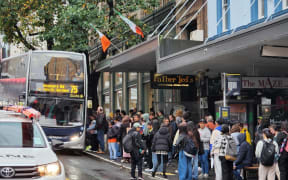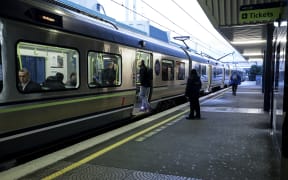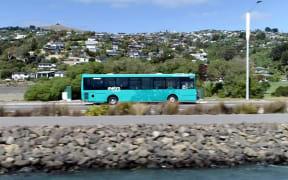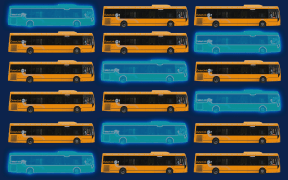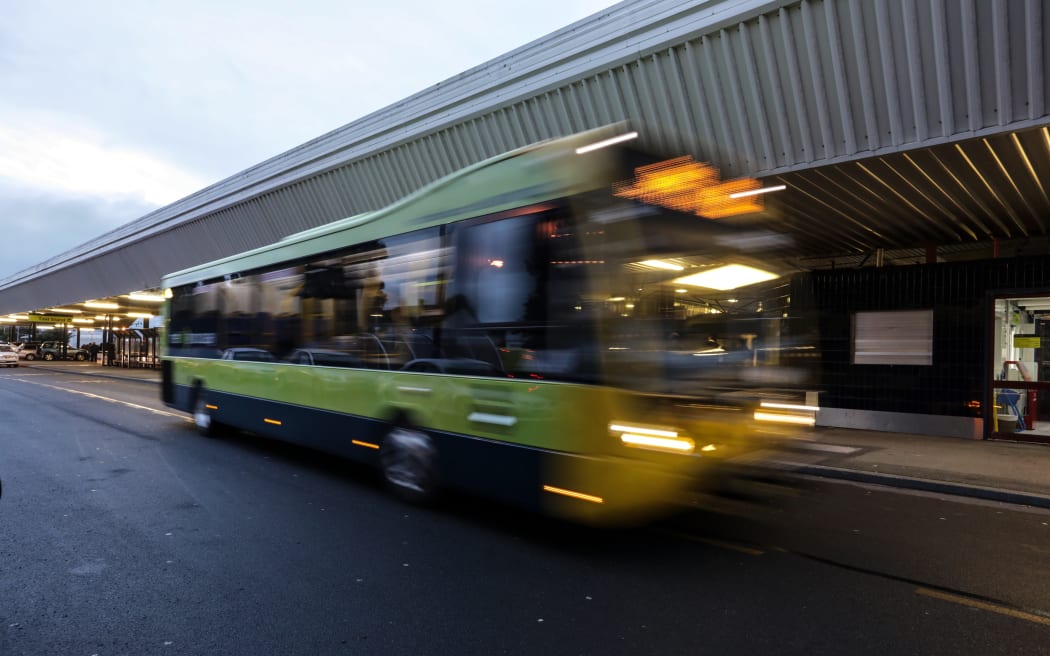
Transport Minister Michael Wood says he cannot blame drivers for quitting in the wake of low pay, poor conditions and hostility from passengers (file image). Photo: RNZ / Rebekah Parsons-King
Safety improvements and better pay are among major incentives for easing a shortage of bus drivers.
Metal-reinforced protective screens will be installed in buses after an increase in abuse resulted in two drivers being stabbed earlier this year.
The screens complement several pay increases in a bid to combat an ongoing bus driver shortage, which has caused delays and disruptions to services throughout the country.
Transport Minister Michael Wood said he could not blame drivers for quitting in the wake of low pay, poor conditions and hostility from passengers.
"The model we've had for a long time has resulted in relatively low levels of pay and conditions that aren't great for many of our bus drivers," he said.
"When you have a situation of low unemployment and people have got choices, why would they put up with that? And more importantly, why would we take that approach, when the work that our bus drivers do is so important to the way that our cities and towns operate?"
Bus drivers felt unsafe as they faced aggression from members of the public.
"These men and women do critical work to serve our community, and they deserve to feel safe at work," Wood said.
"The bus driver protection screens are an important initiative to provide an additional layer of protection and comfort for our bus drivers."
Wood said that since Covid-19, there had been a marked increase in the level of aggression towards bus drivers.
"Where that behaviour occurs, and where perpetrators are found, that will be dealt with properly through the criminal justice system.
"I want to send that really clear message out: There is never any excuse."
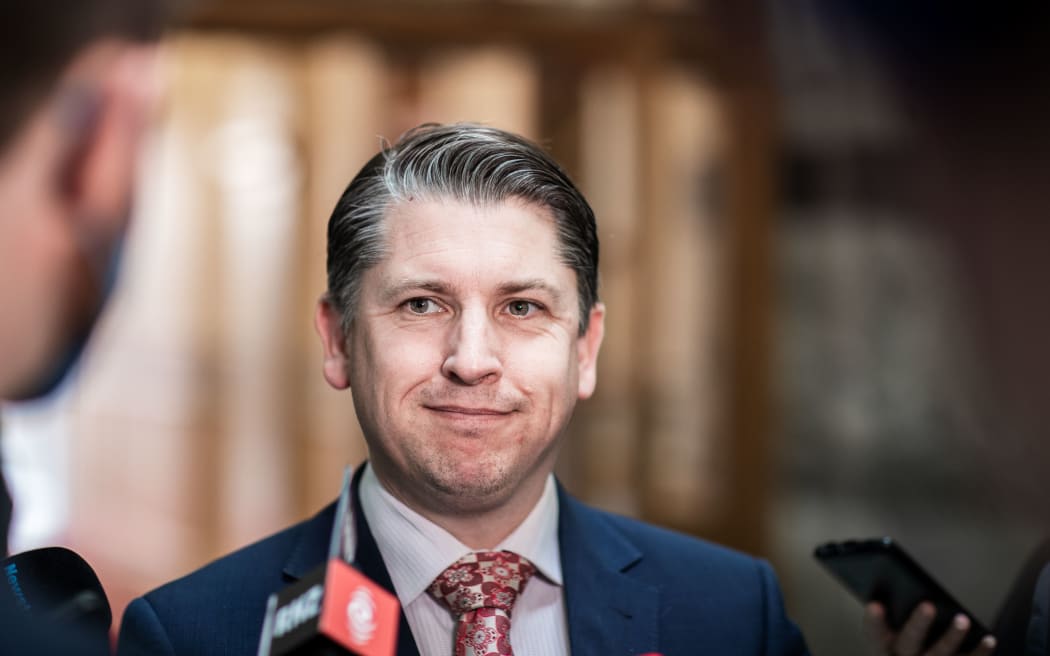
Michael Wood Photo: RNZ / Samuel Rillstone
However, it will be a long time before the screens are installed nationwide. During a trial period, just two Auckland buses are being tested with the new screens.
"We're just checking out what works," Waka Kotahi's public transport manager Delaney Myers said.
"It's important that we roll this out slowly to make sure they're fit for purpose. It'll be a slow process to make sure we get that right. We don't have a timeframe in mind."
Feedback from 200 drivers involved in the trial had been "overwhelmingly positive", she said.
Wood said the screens would not be installed in the rest of the fleet until any flaws had been ironed out.
"You've got to think through issues like, for example, if you have a screen to the left of the driver, might that create some glare? So you need to get the design right," he said.
In the meantime, bus drivers would be offered de-escalation workshops.
Alongside these challenges, Wood said councils were struggling to pay for services.
"As part of Budget 2023 we're investing an additional $140 million which will support both Waka Kotahi and our local councils to fill some of that shortfall and to be able to begin the work of rebuilding services," he said.
Auckland Council pledged another $20m through its budget, which would raise the city's bus driver wages to $30 per hour, up about $2.
"Auckland Transport is cancelling thousands of bus trips every week because there aren't enough drivers," Mayor Wayne Brown said. "One way we can solve that problem is to pay drivers a fair wage."
This was, in part, because Auckland Transport had tightened its own belt. "AT is spending less on corporate overheads and, as a result, there is more funding available for service delivery," he said.
Pay increases were on the table for the rest of the country, too. The transport minister said better wages were key to attracting and retaining vital staff.
"We've sat down with operators, councils and unions to work through an industry standard that we can roll out to stop the race to the bottom and make sure we have fair pay and conditions for our drivers," he said.
There were signs it was working, Wood said. "From the peak of the bus driver shortage, when we were about 860 bus drivers short at the end of last year, we're now down to a shortage of about 460."
By the end of the year, Wood hoped the country's bus services would be in good shape.
"I'm very confident that by [the third or fourth quarter] of this year, we will have substantially got down that bus driver shortage and will be able to get back to better levels of service across our communities," he said.
Rebuilding trust in the network, now eroded through years of disruption and unreliability, could take longer.
"The way that we've got to overcome that is to rebuild the quality and the reliability of services," Wood said. "We are making progress there. I monitor that on a week-to-week basis, the stats come through to me, and we're making steady improvements in all the key areas."
Wellington had already returned to its pre-pandemic passenger figures, while Auckland had recovered to 85 percent, he said.
Fare-dodging rampant
Driver Alan Cheong told Checkpoint although he had not been a victim of violence himself, many of his colleagues had been.
Cheong regularly had intoxicated and aggressive people boarding his bus.
He said the inner-city routes were by far the worst, singling out the CityLink buses as a good place to implement the protective screens first.
Cheong said many people in this area were not paying for their rides. He said the protective screens in the trials may have even emboldened some fare-dodgers.
"On average every day you will have maybe 10 to 20 passengers. Adding that up, it's about 5-10 percent of the passengers come up without a proper payment.
"Sometimes they'll say, 'Oh, I forgot to bring my card'; sometimes they'll say, 'I forgot to top up my card'. Sometimes they come up and say, 'I've got no card - I need a free ride'."
Cheong said drivers were taught to avoid confrontation, and it was not their job to make passengers pay.
"Our priority is to provide a service for the community."
Auckland Transport manager of metro services Darek Koper said the organisation monitored fare avoidance through its bus drivers who kept records for each journey.
He said across the network, AT was seeing fare avoidance of about 2 percent.


